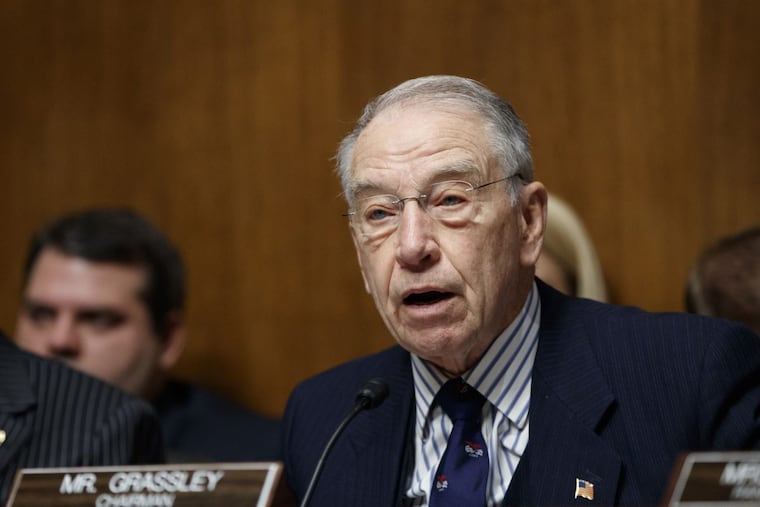GOP rhetoric shows just how much we disdain the poor
By Sen. Chuck Grassley's rationale, if you could somehow avoid sneaking a beer into the theater to see "Justice League" with your girlfriend Friday night, you'd be well on your way to creating a $22 million estate.

Defending Congress' plan to eliminate the estate tax the other day, Sen. Chuck Grassley (R., Iowa) declared that getting rid of it recognizes those who invest their money "as opposed to those that are just spending every darn penny they have, whether it's on booze, or women, or movies."
By Grassley's rationale, if you could somehow avoid sneaking a beer into the theater to see Justice League with your girlfriend Friday night, you'd be well on your way to creating a $22 million estate that could be passed on to your heirs, free of inheritance taxes.
While some politicians issue so-called dog whistles — stealth swipes at minorities or other groups audible only to like-minded thinkers — Grassley's utterance was more of a fog horn.
Low-income people — the poor and much of the working class — are disdained.
And this week, Wisconsin Gov. Scott Walker piled on, announcing his desire to make his state the nation's first to drug-test adults applying for food stamps.
"We don't trust people who need help, and we classify the poor as criminals," said James Ziliak, an economist and the director of the Center for Poverty Research at the University of Kentucky. "It's an old play out of a playbook from the mid-1800s. I do a lot of heavy sighing these days."
That the poor are scorned isn't merely opinion, but a matter of scientific fact.
Susan Fiske, psychology professor at Princeton University, designed tests in which people were placed in neuroimaging machines and shown photos of the poor. Their brains responded as though the photos depicted things, not humans — a sign of revulsion.
Disliking the poor, in fact, is the most negative prejudice people report, Fiske said, greater even than racism.
In the United States, Fiske recently wrote with a coauthor in the journal Current Opinion in Psychology, the poor are often stereotyped as substance abusers, while blue-collar people are generally seen as incompetent. And any people who receive federal benefits are believed to be undeserving.
The fact that the vast majority of food-stamp recipients are children, the disabled, and the elderly doesn't seem to enter into critics' thinking.
Nor can people point to evidence that the poor take more drugs than anyone else.
In fact, when Florida instituted a drug test for all cash-welfare recipients, it was struck down in 2014 as being unconstitutional. (States are allowed to drug-test individuals only if drug use is suspected, not simply for applying for benefits.)
The Florida case was instructive. It turned out that around 2.5 percent of people applying for cash welfare tested positive for illegal drugs — not a big number when you realize that 8 percent of the U.S. population has tested positive for illegal drugs, according to federal figures.
So, what's the rationale for a proposed law like Walker's, which would only add to state expenses?
This is where we get into "people say" territory, as in, "People say anyone who needs government help is on drugs."
Back in 2007, Pennsylvania State Rep. Mike Turzai, a Republican from Allegheny County, proposed a law to fingerprint and drug-test anyone receiving cash welfare or food stamps, now known as SNAP (Supplemental Nutrition Assistance Program). He said he wanted to weed out fraud, but was unable to describe any fraudulent welfare cases he'd discovered.
"A lot of it is anecdotal," he said.
In 2013, Pennsylvania lawmakers took another crack at writing a bill to drug-test cash-welfare recipients. The spokesman for a cosponsor acknowledged that there was no proof that welfare recipients do more drugs than others. But, he said, the issue "gets taxpayers upset."
No bill has been passed so far.
Why do so many people believe that low-income people are less human than the rest of us?
It has to do with stubborn complexities of the mind, said John Dovidio, a Yale University psychologist who studies how people think about the poor.
It goes like this:
In order to survive psychologically, people need to see the world as fair — that we live in a just system in which people get what they deserve.
Everything I have, people reason, I earned through talent, self-control, and discipline.
And those who are disadvantaged deserve their place in life because they must be lazy, impulsive and incautious.
"This is insidious thinking," Dovidio said, "because it's all about blaming the victim."
And it overlooks how low-income people are victimized by a lack of jobs, inefficient schools, unsafe neighborhoods, and myriad other problems that prevent people from moving up the socio-economic ladder.
"Let me tell you something," said Sam Wolfgong, a longtime volunteer at the West Chester Food Cupboard. "Nobody wants to come to a food cupboard to have to eat.
"And the people I see don't have money for movies, booze, and women."